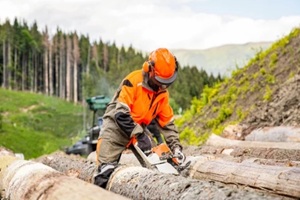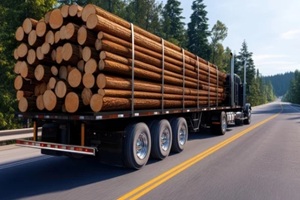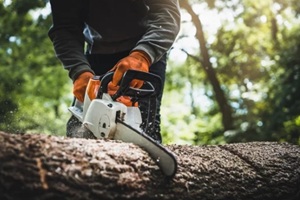
The forestry industry has seen a rise in independent loggers contracted for projects. This setup provides flexibility but also shifts the responsibility of securing proper insurance onto the individual logger. Logging is one of the most dangerous jobs in the country. For independent loggers, the risks go beyond falling trees and heavy machinery. Without the right insurance, a single accident could spell financial disaster.
Understanding the risks and finding the right insurance helps freelancers and subcontractors in the logging sector stay protected without sacrificing efficiency. Below, we have collected some of the most essential coverage options, cost-saving strategies, and expert tips to help independent loggers make informed decisions about insurance.
Unique Risks in the Logging Industry
Every worksite poses the risk of unpredictable dangers. For independent loggers, one wrong move can mean serious injuries or costly downtime. Without a financial safety net, a single accident could erase months of earnings.
The most significant risks independent loggers face include:
- Falling trees and branches: Even experienced loggers can miscalculate tree fall patterns or get caught off guard by an unexpected branch.
- Equipment malfunctions: A chainsaw, skidder, or loader failure can lead to serious injuries and work delays.
- Unstable ground conditions: Logs can roll unexpectedly, and machinery can tip over if the terrain shifts.
- Extreme weather: Rain, snow, and wind can make operations even more dangerous.
Furthermore, unlike full-time employees, independent loggers are responsible for their own insurance. Without the right coverage, a logger could encounter the following challenges:
- Lawsuits from property damage or injury claims
- Personal responsibility for medical bills after an accident
- Out-of-pocket costs for damaged or stolen equipment
For independent loggers, proper insurance coverage lays the foundation for a stable, successful, and financially secure business.
Essential Insurance Coverage for Freelance Loggers and Subcontractors
Independent loggers need essential insurance policies to cover common risks and prevent financial loss. These policies include:
General Liability Insurance
If an independent logger causes property damage or injury, they are personally responsible for the costs. General liability insurance shields independent loggers from financial ruin by covering the following risks:
- Property damage: For example, if a tree falls on a nearby structure.
- Injury liability: If a landowner or crew member is hurt, the medical bills and legal fees can add up quickly.
- Legal defense: Even if the logger is not at fault, the cost of a lawsuit can be devastating.
Workers’ Compensation Insurance
Workers’ compensation insurance is a necessary safety net that protects employees and employers from financial loss resulting from job-related injuries or illnesses. But, unlike most employees, freelancers and subcontractors do not automatically qualify for workers’ compensation under the hiring company’s policy.
What this means:
- If an independent logger is hurt on the job, the hospital bills come out of their own savings.
- They will not get paid while they recover unless they have insurance to replace lost wages.
- They will not receive compensation for any resulting permanent disability unless they have the right insurance coverage.
Before taking a job, independent loggers should verify their eligibility for workers’ compensation, obtain their own coverage if necessary, or work with a trusted logging insurance agent to explore their options.
Commercial Auto Insurance
Logging operations rely on trucks, trailers, and haulers, but personal auto insurance policies do not cover business-related accidents. Independent loggers often need commercial auto insurance to protect against:

- Accidents resulting in vehicle damage
- Liability for accidents resulting in injuries to third parties
- Necessary repairs or replacements due to vandalism or theft
Without this coverage, independent loggers could incur significant vehicle-related losses.
Specialized Insurance Options for Logging Professionals
Beyond basic coverages, independent loggers should also consider additional insurance to protect their equipment and meet industry requirements.
Inland Marine Insurance for Equipment
Logging requires high-value machinery, such as skidders, loaders, and chainsaws. Risks include:
- Accidents and impact damage
- Theft or vandalism at remote sites
- Breakdowns that lead to costly work stoppages
Inland marine insurance provides comprehensive coverage for logging equipment, whether in use, in transit, or in storage.
Environmental Liability Coverage
Logging operations sometimes result in unintended environmental damage, such as:
- Fuel spills from logging machinery
- Accidental harm to protected lands or waterways
- Claims from landowners or regulatory agencies
Environmental liability insurance helps cover cleanup costs, legal fees, and damages related to these incidents. In Virginia, this coverage is often a requirement for logging permits.
Cost-Effective Strategies for Insurance Coverage
Good insurance does not have to drain your profits. Here are some ways independent loggers can protect themselves without overpaying:
Bundling Policies for Savings
Many insurance providers offer discounts when loggers bundle multiple policies. Standard bundling options include:
- General liability + workers’ compensation
- Commercial auto + inland marine insurance
- Environmental liability + general liability
Combining policies usually lowers costs and simplifies claims management.
Using Safety Practices to Lower Premiums
Insurance providers base premiums on the level of risk. Independent loggers can reduce their insurance costs by implementing the following safety practices to lower the risk involved in their operations:
- Taking safety courses approved by industry regulators
- Following proper logging procedures
- Investing in high-quality safety gear
- Keeping up with equipment maintenance
Some insurance companies reward safe operations with reduced rates.
Why Working With the Right Insurance Agency Matters

Before purchasing insurance, independent loggers should assess their needs based on the type of logging work they perform, the value of their equipment, and the requirements of the state and the client. A knowledgeable insurance agency can customize insurance coverage based on these factors, preventing coverage gaps and unnecessary expenses.
Contact Burton & Company Today to Protect Your Logging Business
A single accident can erase everything an independent logger has worked for. Proper insurance covers costly equipment damage, loss of income due to injury or work stoppage, and exposure to liability that could lead to lawsuits.
At Burton & Company, we offer customized policies for independent loggers and subcontractors, comprehensive coverage that meets Virginia’s regulations, and personalized support from insurance professionals who understand the nuances of this challenging industry. Contact Burton & Company today to secure the insurance coverage you need to keep logging with confidence.

